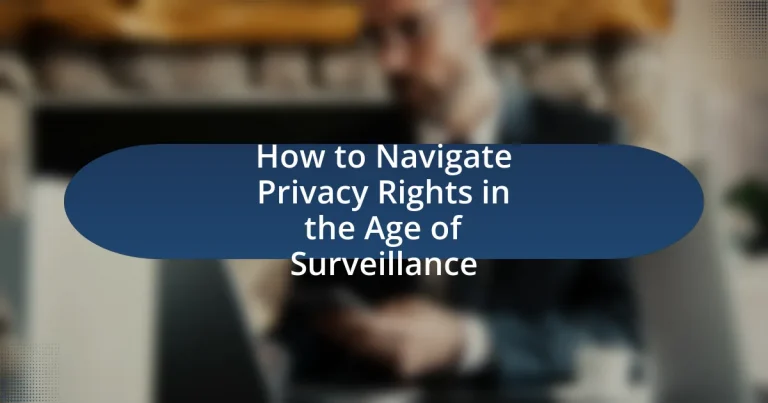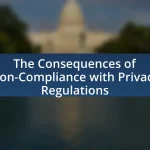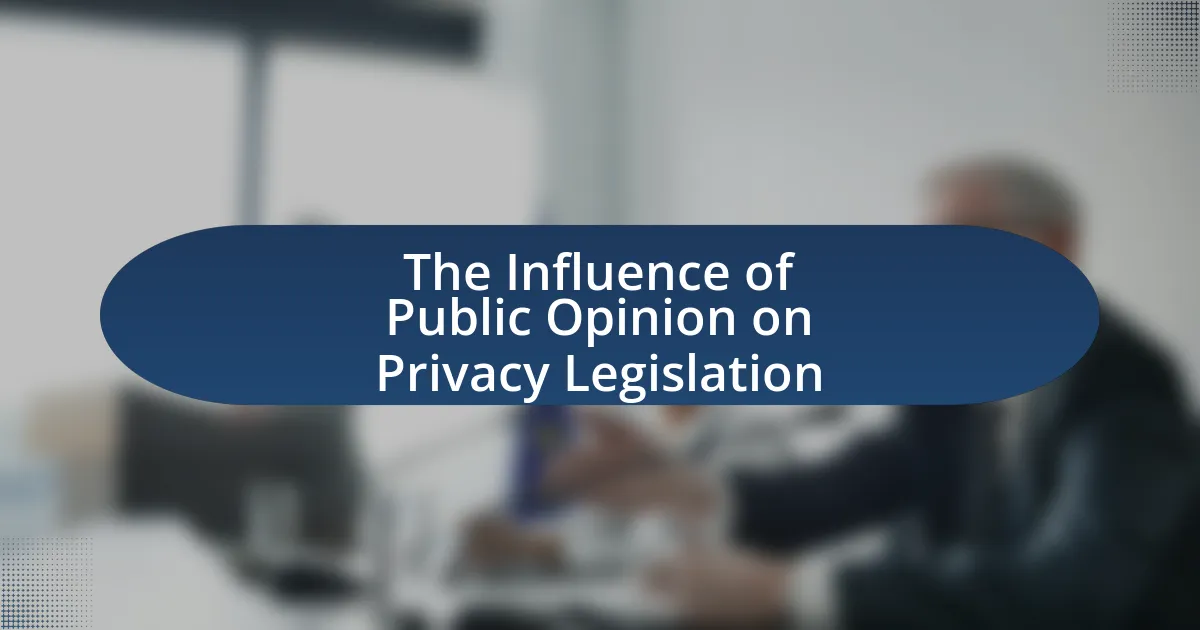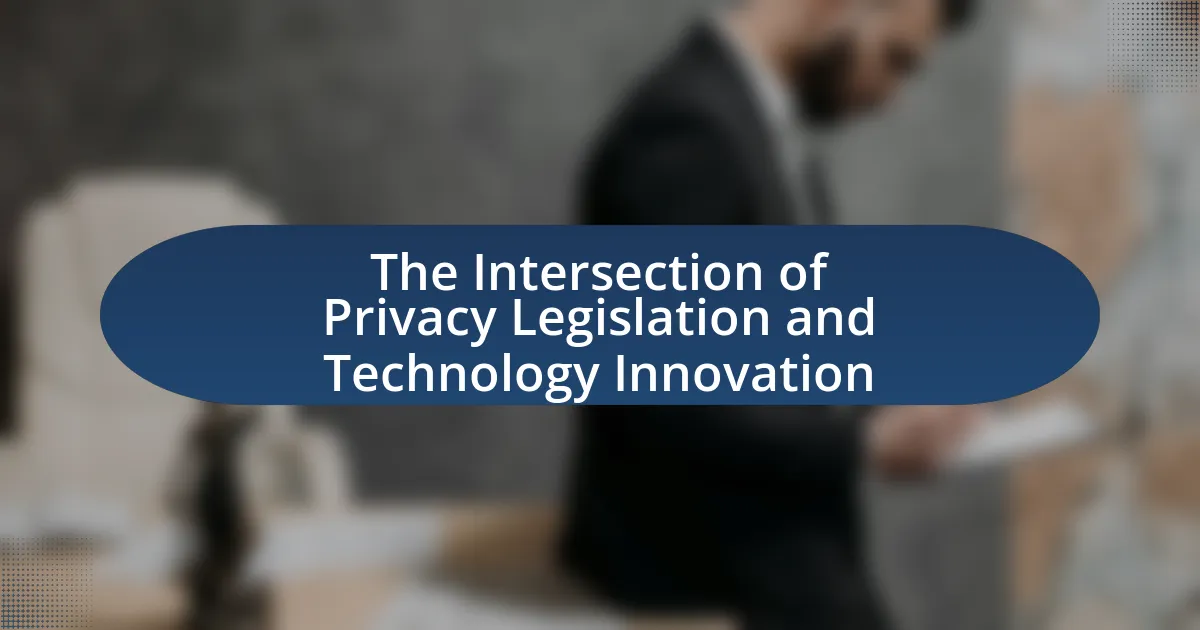The article focuses on navigating privacy rights in the context of increasing surveillance. It defines privacy rights as legal and ethical entitlements that protect individuals from intrusive monitoring, grounded in frameworks like the Fourth Amendment and the GDPR. The discussion includes the evolution of privacy rights in response to surveillance technologies, the impact of historical events, and the varying definitions of privacy rights across different countries. It highlights the importance of privacy rights in safeguarding personal freedom, the risks associated with inadequate protections, and the role of government and corporate surveillance. Additionally, the article outlines practical steps individuals can take to protect their privacy rights and the future trends in privacy legislation and technology.

What are Privacy Rights in the Context of Surveillance?
Privacy rights in the context of surveillance refer to the legal and ethical entitlements individuals have to control their personal information and maintain their autonomy against intrusive monitoring. These rights are grounded in various legal frameworks, such as the Fourth Amendment in the United States, which protects against unreasonable searches and seizures, and the General Data Protection Regulation (GDPR) in the European Union, which establishes strict guidelines for data collection and processing. The increasing prevalence of surveillance technologies, such as CCTV cameras and digital tracking, raises significant concerns about the erosion of these rights, as evidenced by studies indicating that over 60% of individuals feel their privacy is compromised by surveillance practices.
How have privacy rights evolved in response to surveillance technologies?
Privacy rights have evolved significantly in response to surveillance technologies, primarily through the establishment of legal frameworks and regulations aimed at protecting individual privacy. For instance, the introduction of the General Data Protection Regulation (GDPR) in the European Union in 2018 marked a pivotal moment, granting individuals greater control over their personal data and imposing strict obligations on organizations regarding data handling. Additionally, landmark court cases, such as Katz v. United States (1967), have reinforced the notion that individuals have a reasonable expectation of privacy, influencing how surveillance practices are scrutinized legally. These developments reflect a growing recognition of the need to balance technological advancements with the protection of personal privacy rights.
What historical events have shaped current privacy rights?
The historical events that have shaped current privacy rights include the ratification of the Fourth Amendment in 1791, which protects against unreasonable searches and seizures, and the landmark Supreme Court case Katz v. United States in 1967, which established the “reasonable expectation of privacy” standard. The Fourth Amendment was a response to colonial abuses by British authorities, ensuring individuals’ rights to privacy in their homes and personal effects. Katz v. United States further expanded privacy rights by affirming that electronic eavesdropping without a warrant violated the Fourth Amendment, thus adapting privacy protections to modern technology. These events laid the foundation for contemporary privacy laws and continue to influence legal interpretations of privacy rights today.
How do different countries define privacy rights?
Different countries define privacy rights through various legal frameworks and cultural contexts. For instance, the European Union emphasizes privacy rights through the General Data Protection Regulation (GDPR), which grants individuals control over their personal data and mandates strict consent requirements for data processing. In contrast, the United States approaches privacy rights more fragmented, with sector-specific laws like the Health Insurance Portability and Accountability Act (HIPAA) for health information and the California Consumer Privacy Act (CCPA) for consumer data, reflecting a more decentralized view of privacy. Additionally, countries like Canada have established privacy rights through the Personal Information Protection and Electronic Documents Act (PIPEDA), which outlines how private sector organizations must handle personal information. These varying definitions highlight the influence of legal, cultural, and historical factors on privacy rights across different nations.
Why are privacy rights important in the age of surveillance?
Privacy rights are crucial in the age of surveillance because they protect individuals from unwarranted intrusion and abuse of power. In a society where technology enables constant monitoring, privacy rights serve as a safeguard against potential violations by governments and corporations. For instance, the 2013 revelations by Edward Snowden highlighted extensive surveillance programs that infringed on personal privacy, demonstrating the need for robust privacy protections. Furthermore, studies indicate that a lack of privacy can lead to self-censorship and a chilling effect on free expression, which are fundamental to democratic societies. Thus, privacy rights are essential for maintaining individual autonomy and safeguarding civil liberties in an increasingly surveilled world.
What risks do individuals face without strong privacy protections?
Individuals without strong privacy protections face significant risks, including identity theft, data breaches, and unauthorized surveillance. These risks arise because personal information can be easily accessed and exploited by malicious actors. For instance, according to the Identity Theft Resource Center, there were over 1,100 data breaches reported in the United States in 2020, exposing millions of individuals’ sensitive information. Additionally, without robust privacy measures, individuals are vulnerable to targeted advertising and manipulation, as companies can track online behavior and preferences. This lack of privacy can lead to a loss of autonomy and increased exposure to scams and fraud.
How do privacy rights impact personal freedom and autonomy?
Privacy rights significantly enhance personal freedom and autonomy by safeguarding individuals from unwarranted intrusion and surveillance. When privacy rights are upheld, individuals can express themselves, make choices, and engage in activities without fear of being monitored or judged. For instance, the European Union’s General Data Protection Regulation (GDPR) establishes strict guidelines on data collection and processing, empowering individuals with control over their personal information. This legal framework illustrates how privacy rights can foster an environment where personal autonomy is respected, allowing individuals to navigate their lives without external pressures or constraints.
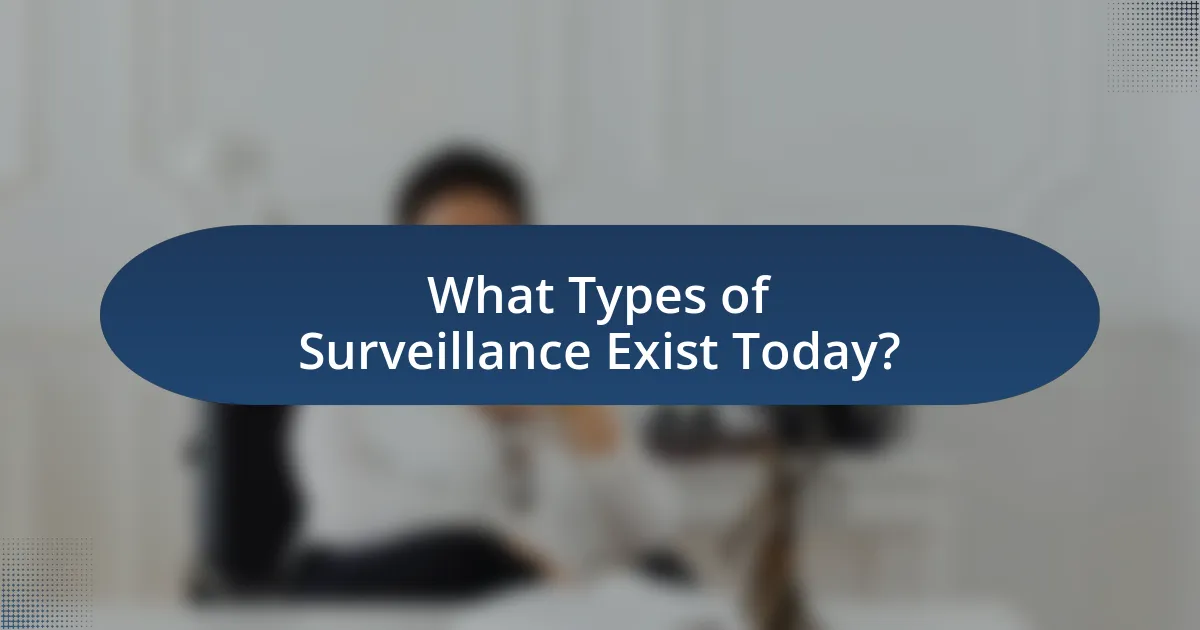
What Types of Surveillance Exist Today?
Today, various types of surveillance exist, including video surveillance, electronic surveillance, and data surveillance. Video surveillance involves the use of cameras to monitor public and private spaces, commonly seen in retail stores and urban areas. Electronic surveillance encompasses monitoring communications through devices such as phones and computers, often utilized by law enforcement and intelligence agencies. Data surveillance refers to the collection and analysis of personal data from online activities, which is frequently conducted by corporations for targeted advertising and by governments for security purposes. These surveillance methods are supported by advancements in technology, making them more pervasive and effective in monitoring individuals and populations.
How do government surveillance practices affect privacy rights?
Government surveillance practices significantly undermine privacy rights by enabling the collection and analysis of personal data without individual consent. This intrusion often occurs through various means, such as mass data collection, monitoring of communications, and the use of advanced technologies like facial recognition. For instance, the USA PATRIOT Act, enacted after the September 11 attacks, expanded government surveillance capabilities, leading to widespread monitoring of citizens’ online activities. Studies, such as those conducted by the Electronic Frontier Foundation, indicate that such practices create a chilling effect on free speech and discourage individuals from exercising their rights to privacy and expression.
What are the legal frameworks governing government surveillance?
The legal frameworks governing government surveillance primarily include constitutional provisions, statutory laws, and international treaties. In the United States, the Fourth Amendment protects citizens against unreasonable searches and seizures, establishing a legal basis for privacy rights. Statutory laws such as the Foreign Intelligence Surveillance Act (FISA) and the USA PATRIOT Act further define the scope and limitations of government surveillance activities. Internationally, treaties like the International Covenant on Civil and Political Rights (ICCPR) emphasize the right to privacy, influencing national laws. These frameworks collectively shape the legal landscape of government surveillance, ensuring a balance between national security and individual privacy rights.
How do citizens respond to government surveillance initiatives?
Citizens often respond to government surveillance initiatives with a mix of concern, resistance, and advocacy for privacy rights. Many individuals express anxiety over potential abuses of power and the erosion of civil liberties, as evidenced by widespread protests and public outcry following revelations of mass surveillance programs, such as those exposed by Edward Snowden in 2013. Research indicates that a significant portion of the population supports stronger privacy protections and legislative measures to limit government surveillance, reflecting a desire for accountability and transparency. For instance, a 2021 Pew Research Center survey found that 81% of Americans feel that the risks of government surveillance outweigh the benefits. This response underscores a growing demand for privacy rights in the context of increasing surveillance practices.
What role does corporate surveillance play in privacy rights?
Corporate surveillance significantly impacts privacy rights by enabling companies to collect, analyze, and utilize personal data without explicit consent. This practice often leads to the erosion of individual privacy, as seen in cases where companies like Facebook and Google have faced scrutiny for their data handling practices. For instance, a 2019 report by the Electronic Frontier Foundation highlighted that over 70% of internet users are concerned about their online privacy, yet many remain unaware of the extent of data collection by corporations. This disconnect illustrates how corporate surveillance can undermine privacy rights, as individuals may not fully understand how their data is being used or the implications of such surveillance on their personal freedoms.
How do companies collect and use personal data?
Companies collect personal data through various methods, including online forms, cookies, mobile applications, and social media interactions. They use this data to enhance user experience, target advertising, improve products and services, and analyze consumer behavior. For instance, a 2020 report by the International Association of Privacy Professionals indicated that 79% of companies utilize customer data for personalized marketing strategies, demonstrating the widespread practice of data-driven decision-making in business.
What are the implications of corporate surveillance on consumer privacy?
Corporate surveillance significantly undermines consumer privacy by enabling companies to collect, analyze, and utilize personal data without explicit consent. This pervasive data collection often leads to unauthorized tracking of consumer behavior, resulting in a loss of anonymity and control over personal information. For instance, a 2020 report by the Electronic Frontier Foundation highlighted that 79% of Americans are concerned about how their data is being used by corporations, indicating widespread apprehension regarding privacy violations. Furthermore, the Cambridge Analytica scandal exemplified the potential misuse of consumer data, where personal information was exploited for political advertising without user consent, raising ethical concerns about corporate practices. These implications underscore the urgent need for robust privacy regulations to protect consumer rights in an increasingly surveilled digital landscape.
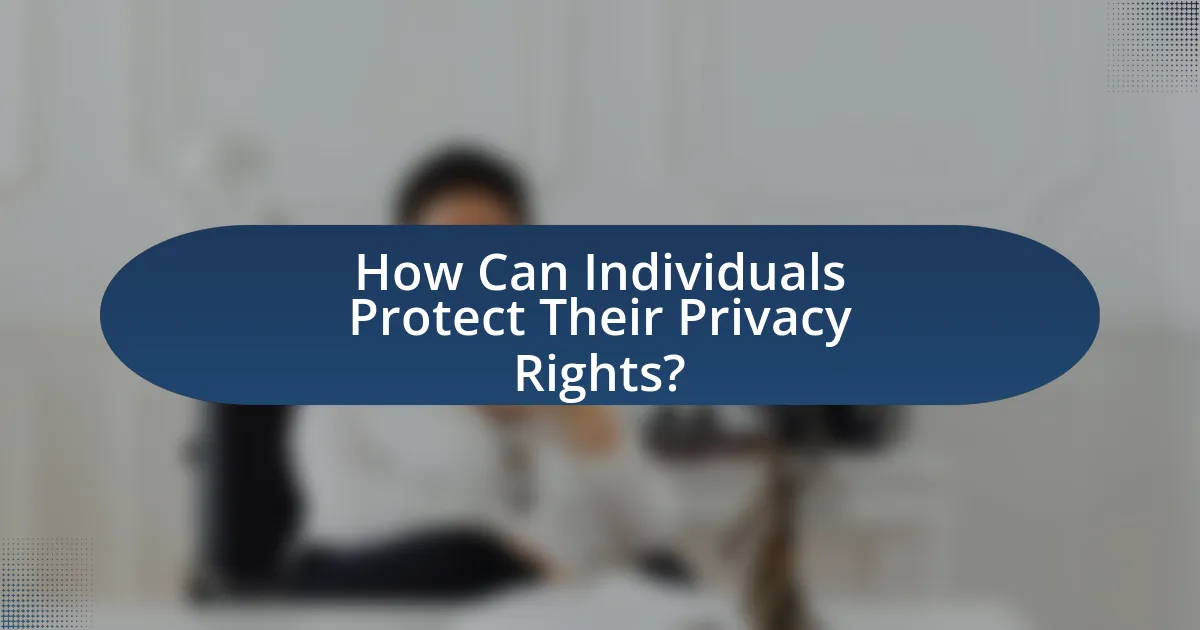
How Can Individuals Protect Their Privacy Rights?
Individuals can protect their privacy rights by implementing strong security measures, such as using encryption tools, employing strong passwords, and being cautious about sharing personal information online. For instance, utilizing end-to-end encryption for communications ensures that only the intended recipients can access the content, thereby safeguarding sensitive data from unauthorized access. Additionally, studies indicate that 81% of data breaches are caused by weak or stolen passwords, highlighting the importance of using complex passwords and changing them regularly. Furthermore, individuals should regularly review privacy settings on social media platforms and limit the amount of personal information shared publicly, as this can significantly reduce the risk of identity theft and privacy violations.
What strategies can individuals employ to safeguard their privacy?
Individuals can safeguard their privacy by employing strategies such as using strong, unique passwords, enabling two-factor authentication, and utilizing encryption tools. Strong passwords reduce the risk of unauthorized access, while two-factor authentication adds an extra layer of security by requiring a second form of verification. Encryption tools protect sensitive data by converting it into a secure format that can only be read by authorized users. According to a 2021 study by the Cybersecurity & Infrastructure Security Agency, implementing these strategies can significantly decrease the likelihood of data breaches and identity theft.
How can technology tools enhance personal privacy?
Technology tools enhance personal privacy by providing encryption, secure communication channels, and data anonymization. Encryption tools, such as Signal and WhatsApp, protect messages from unauthorized access by converting them into unreadable formats for anyone without the decryption key. Secure communication channels, like VPNs, mask users’ IP addresses, making online activities harder to trace. Data anonymization techniques, employed by services like DuckDuckGo, prevent tracking by removing identifiable information from user data. These tools collectively empower individuals to maintain control over their personal information and reduce the risk of surveillance.
What are best practices for managing personal data online?
Best practices for managing personal data online include using strong, unique passwords for each account, enabling two-factor authentication, and regularly reviewing privacy settings on social media and other platforms. Strong passwords reduce the risk of unauthorized access, while two-factor authentication adds an extra layer of security. Regularly reviewing privacy settings ensures that users are aware of what data is being shared and with whom. According to a 2021 study by the Pew Research Center, 81% of Americans feel they have little to no control over the data collected about them, highlighting the importance of proactive management of personal data.
What legal resources are available for individuals facing privacy violations?
Individuals facing privacy violations can access various legal resources, including federal and state privacy laws, legal aid organizations, and privacy advocacy groups. Federal laws such as the Privacy Act of 1974 and the Health Insurance Portability and Accountability Act (HIPAA) provide protections for personal information. State laws, like the California Consumer Privacy Act (CCPA), offer additional rights regarding personal data. Legal aid organizations, such as the American Civil Liberties Union (ACLU), provide resources and legal assistance for individuals seeking to address privacy violations. Furthermore, privacy advocacy groups, including the Electronic Frontier Foundation (EFF), offer guidance on navigating privacy rights and legal recourse. These resources collectively empower individuals to understand and assert their privacy rights effectively.
How can individuals seek redress for privacy infringements?
Individuals can seek redress for privacy infringements by filing complaints with relevant regulatory authorities, pursuing legal action, or seeking mediation. Regulatory authorities, such as data protection agencies, often have established procedures for individuals to report violations of privacy laws, such as the General Data Protection Regulation (GDPR) in the European Union, which allows individuals to lodge complaints against organizations that mishandle personal data. Legal action can be pursued through civil lawsuits, where individuals may claim damages for breaches of privacy rights, supported by legal precedents that affirm the right to privacy. Mediation services can also facilitate resolution between individuals and organizations without resorting to litigation, providing a less adversarial approach to addressing privacy concerns.
What organizations provide support for privacy rights advocacy?
Organizations that provide support for privacy rights advocacy include the Electronic Frontier Foundation (EFF), the American Civil Liberties Union (ACLU), and Privacy International. The EFF focuses on defending civil liberties in the digital world, advocating for user privacy and free expression. The ACLU works to protect individual rights and liberties guaranteed by the Constitution, including privacy rights. Privacy International is dedicated to fighting for the right to privacy across the globe, conducting research and campaigning against government surveillance and corporate data exploitation. These organizations are recognized for their significant contributions to privacy rights advocacy through legal action, public education, and policy reform efforts.
What are the future trends in privacy rights and surveillance?
Future trends in privacy rights and surveillance indicate a shift towards stronger regulatory frameworks and increased public awareness. Governments are likely to implement more stringent data protection laws, similar to the General Data Protection Regulation (GDPR) in Europe, which emphasizes individual consent and data ownership. Additionally, advancements in technology, such as artificial intelligence and blockchain, may enhance privacy measures by enabling more secure data management and user control. Public sentiment is increasingly favoring privacy, as evidenced by surveys showing that a significant majority of individuals express concern over data misuse and surveillance practices. This growing demand for privacy rights is likely to influence policymakers and corporations to prioritize ethical data handling and transparency.
How might emerging technologies impact privacy rights?
Emerging technologies significantly impact privacy rights by enabling extensive data collection and surveillance capabilities. For instance, advancements in artificial intelligence and big data analytics allow companies and governments to gather, analyze, and utilize personal information at unprecedented scales. A report by the Electronic Frontier Foundation highlights that technologies like facial recognition and Internet of Things devices can track individuals’ movements and behaviors, often without their consent. This pervasive monitoring raises concerns about the erosion of personal privacy and the potential for misuse of sensitive information, as evidenced by incidents where data breaches exposed millions of individuals’ private data.
What role will legislation play in shaping future privacy protections?
Legislation will play a crucial role in shaping future privacy protections by establishing legal frameworks that govern data collection, usage, and sharing practices. As technology evolves, lawmakers are increasingly recognizing the need for comprehensive privacy laws, such as the General Data Protection Regulation (GDPR) in Europe, which sets stringent guidelines for data protection and empowers individuals with rights over their personal information. These legislative measures are essential for holding organizations accountable, ensuring transparency, and providing individuals with recourse in cases of data breaches or misuse. The ongoing development of privacy legislation reflects a growing societal demand for stronger protections in an era marked by pervasive surveillance and data exploitation.
What practical steps can individuals take to navigate privacy rights effectively?
Individuals can navigate privacy rights effectively by understanding their legal rights, utilizing privacy tools, and being proactive in managing personal data. First, individuals should familiarize themselves with privacy laws applicable in their jurisdiction, such as the General Data Protection Regulation (GDPR) in Europe, which grants rights like data access and deletion. Second, using privacy-enhancing tools, such as virtual private networks (VPNs), encrypted messaging apps, and privacy-focused browsers, can help protect personal information from unauthorized access. Third, individuals should regularly review and adjust privacy settings on social media and online accounts to limit data sharing. According to a 2021 survey by the Pew Research Center, 81% of Americans feel they have little to no control over the data collected about them, highlighting the importance of these proactive measures in safeguarding privacy rights.
